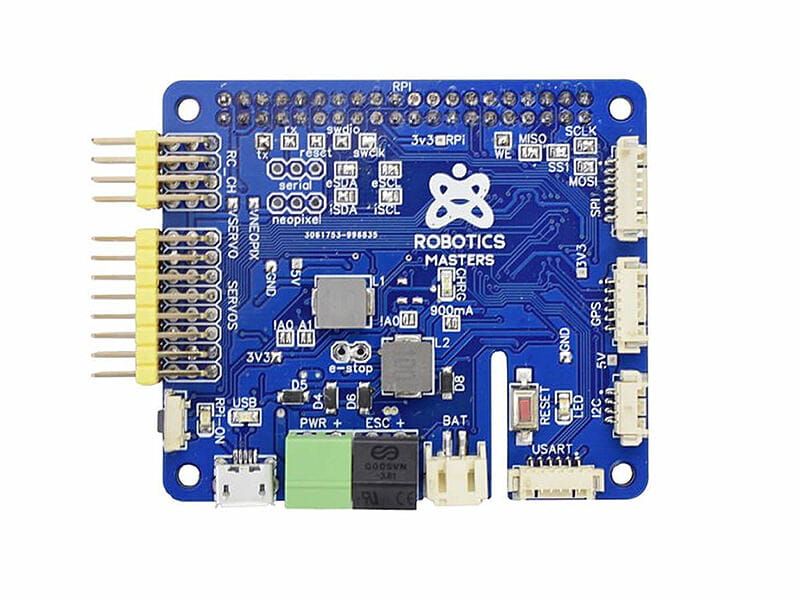
Robo HAT MM1 M4 by Robotics Masters
The Robotics Masters Robo HAT MM1 is an open source robotics controller board for Raspberry Pi. It is education focused but works in many applications. The Robo HAT provides all the hardware you need in one simple, easy-to-use form factor. It removes the initial barriers to starting any robotics project.
With support for Adafruit CircuitPython and other libraries the Robo HAT is able to act as a single solution for all projects great and small.
The Robo HAT MM1 removes the need for buying lots of individual components by including them on the board. It can act as a PWM driver, provide on-board power through voltage regulators, and measure movement with the on-board IMU - all at the same time.
The wide compatibility with many open source software platforms such as CircuitPython means you can use all existing software for sensors while creating your project in the way that works best for you. The hardware schematics and software are fully open source.
Purchase
Contribute
Have some info to add for this board? Edit the source for this page here.
CircuitPython 10.0.3
This is the latest stable release of CircuitPython that will work with the Robo HAT MM1 M4. Use this release if you are new to CircuitPython.
Modules included in this download
_asyncio _bleio _bleio (HCI co-processor) _pixelmap adafruit_bus_device adafruit_pixelbuf aesio alarm analogio array atexit audiocore audioio audiomixer audiomp3 binascii bitbangio board builtins builtins.pow3 busio busio.SPI busio.UART codeop collections countio digitalio errno floppyio getpass i2ctarget io json keypad keypad.KeyMatrix keypad.Keys keypad.ShiftRegisterKeys locale math microcontroller msgpack neopixel_write nvm onewireio os os.getenv ps2io pulseio pwmio rainbowio random re rotaryio rtc samd sdcardio select spitarget storage struct supervisor synthio sys time touchio traceback ulab usb_cdc usb_hid usb_midi warnings watchdog zlibIncluded frozen(?) modules: neopixel
Features: Robotics
CircuitPython 10.1.0-rc.1
This is the latest development release of CircuitPython that will work with the Robo HAT MM1 M4.
Alpha development releases are early releases. They are unfinished, are likely to have bugs, and the features they provide may change. Beta releases may have some bugs and unfinished features, but should be suitable for many uses. A Release Candidate (rc) release is considered done and will become the next stable release, assuming no further issues are found.
Please try alpha, beta, and rc releases if you are able. Your testing is invaluable: it helps us uncover and find issues quickly.
Modules included in this download
_asyncio _bleio _bleio (HCI co-processor) _pixelmap adafruit_bus_device adafruit_pixelbuf aesio alarm analogio array atexit audiocore audioio audiomixer audiomp3 binascii bitbangio board builtins builtins.pow3 busio busio.SPI busio.UART codeop collections countio digitalio errno floppyio getpass i2ctarget io json keypad keypad.KeyMatrix keypad.Keys keypad.ShiftRegisterKeys locale math microcontroller msgpack neopixel_write nvm onewireio os os.getenv ps2io pulseio pwmio rainbowio random re rotaryio rtc samd sdcardio select spitarget storage struct supervisor synthio sys time touchio traceback ulab usb_cdc usb_hid usb_midi warnings watchdog zlibIncluded frozen(?) modules: neopixel
Features: Robotics
Absolute Newest
Every time we commit new code to CircuitPython we automatically build binaries for each board and language. The binaries are stored on Amazon S3, organized by board, and then by language. These releases are even newer than the development release listed above. Try them if you want the absolute latest and are feeling daring or want to see if a problem has been fixed.
Previous Versions of CircuitPython
All previous releases of CircuitPython are available for download from Amazon S3 through the button below. For very old releases, look in the OLD/ folder for each board. Release notes for each release are available at GitHub button below.
Older releases are useful for testing if you something appears to be broken in a newer release but used to work, or if you have older code that depends on features only available in an older release. Otherwise we recommend using the latest stable release.
Update UF2 Bootloader
Latest version: v3.16.0
The bootloader allows you to load CircuitPython, MakeCode, and Arduino programs. The bootloader is not CircuitPython. You can check the current version of your bootloader by looking in the INFO_UF2.TXT file when the BOOT drive is visible (FEATHERBOOT, CPLAYBOOT, etc.).
It is not necessary to update your bootloader if it is working fine. Read the release notes on GitHub to see what has been changed. In general, we recommend you not update the bootloader unless you know there is a problem with it or a support person has asked you to try updating it.
To update, first save the contents of CIRCUITPY, just in case. Then double-click the reset button to show the BOOT drive. Drag the update-bootloader .uf2 file to the BOOT drive. Wait a few tens of seconds for the bootloader to update; the BOOT drive will reappear. After you update, check INFO_UF2.TXT to verify that the bootloader version has been updated. Then you will need to reload CircuitPython.
